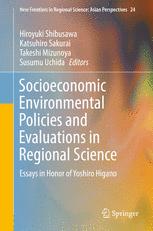

Most ebook files are in PDF format, so you can easily read them using various software such as Foxit Reader or directly on the Google Chrome browser.
Some ebook files are released by publishers in other formats such as .awz, .mobi, .epub, .fb2, etc. You may need to install specific software to read these formats on mobile/PC, such as Calibre.
Please read the tutorial at this link. https://ebooknice.com/page/post?id=faq
We offer FREE conversion to the popular formats you request; however, this may take some time. Therefore, right after payment, please email us, and we will try to provide the service as quickly as possible.
For some exceptional file formats or broken links (if any), please refrain from opening any disputes. Instead, email us first, and we will try to assist within a maximum of 6 hours.
EbookNice Team

Status:
Available0.0
0 reviewsThis book is a volume of essays celebrating the life and work of Yoshiro Higano, professor of Environmental Policy, Doctoral Program in Sustainable Environmental Studies, Graduate School of Life and Environmental Sciences, University of Tsukuba, Japan. Prof. Higano’s research strongly focuses on the comprehensive evaluation of resources and research content for decision science and engineering, including simulation modeling for environmental quality control, the evaluation of environmental remediation technologies, integrated river (lake) basin management, and synthesized environmental policy. Yoshiro Higano is the past president of the Regional Science Association International (RSAI) and the current president of the Japan Section of the RSAI (JSRSAI). He also served as executive secretary for the Pacific Regional Science Conference Organizations (PRSCO). This edited volume covers a wide range of regional science approaches, theory, policy, evaluation, modeling, simulation, and practice. It is a valuable reference work for researchers, scholars, policy makers, and students in the field of regional science. The volume celebrates Prof. Higano’s contributions to the JSRSAI, PRSCO, and RSAI. Essay contributors include his former students and a wide array of regional scientists, each with a personal connection to Prof. Higano.